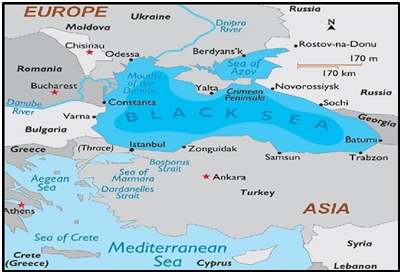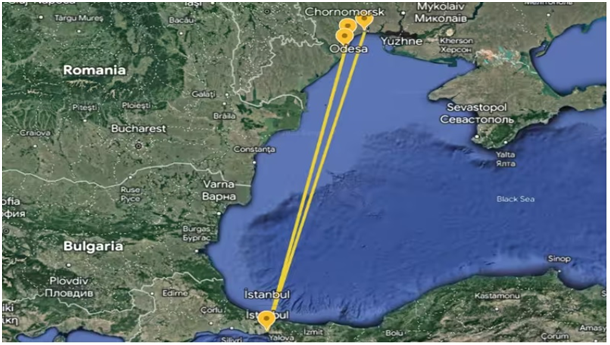Black Sea Grain Deal
06-09-2023
11:39 AM

What’s in today’s article?
- Why in news?
- What is the Geographical location of Black Sea?
- What is Black Sea grain deal?
- Why did Russia refuse to renew it?
- What has happened since the deal came to an end?
Why in news?
- Turkish President Tayyip Erdogan said he was confident Russia would soon revive the Black Sea grain deal.
- This statement came after Erdogan held talks with Putin at the Russian Black Sea resort of Sochi.
- This deal was signed in July 2022 and assured safe passage to ships carrying grain from Ukraine.
- In July 2023, Russia refused to extend the deal. Since then, Turkey has repeatedly pledged to renew it to help avoid a food crisis in parts of Africa, the Middle East and Asia.
- Russia’s President Vladimir Putin, however, said the deal will not be restored until the West meets its obligations to facilitate Russian agricultural exports.

Geographical location of Black Sea
- The Black Sea lies between the continents of Asia and Europe.
- It is bound to the west by the Balkan Peninsula, to the east by the Caucasus, north by East European Plains, and south by Anatolia of Western Asia.
- It is bordered by Ukraine to the north, Russia to the northeast, Georgia to the east, Turkey to the south, and Bulgaria and Romania to the west.
- The black Sea drainage basin drains several countries, including the six countries that share its coast.
What is Black Sea grain deal?
- Background
- Ukraine is among the world’s biggest exporter of foodgrains, such as wheat and corn, and a major contributor to the UN’s food aid programmes.
- When Russia invaded the country and blockaded its ports, it sent food prices soaring and raised fears of food security in the poorer nations of the world.
- Pakistan, for instance, saw wheat prices skyrocket to crisis levels.
- Against this backdrop, the UN and Turkey got Russia to agree to the Black Sea Grain Initiative.
- About
- In July 2022, Russia and Ukraine signed a deal to reopen grains exports from Ukrainian Black Sea ports.
- The agreement is also known as the Black Sea Initiative.
- Under the initiative, cargo ships would be allowed to travel from and to three Ukrainian ports of Odesa, Chornomorsk and Pivdennyi (Yuzhny), after inspection that they weren’t carrying arms.
- The safe passage in the Black Sea was 310 nautical miles long and three nautical miles wide.
- A control centre was established in Istanbul, staffed by U.N., Turkish, Russian and Ukrainian officials, to run and coordinate the process.
- The deal has been extended twice, and expired on July 17.
- Significance of this deal:
- It brought relief for developing countries on the edge of bankruptcy and the most vulnerable people on the edge of famine.
- The United Nations says ripple effects of the war could increase the number of people facing severe food insecurity by 47 million.
- It also helped stabilize global food prices which were already at record levels even before the war.
- Ukraine is one of the world's largest exporters of wheat, corn and sunflower oil, but Russia's invasion of the country and naval blockade of its ports have halted shipments.
- Some grain is being transported through Europe by rail, road and river, but the prices of vital commodities like wheat and barley have soared.
- It brought relief for developing countries on the edge of bankruptcy and the most vulnerable people on the edge of famine.
Why did Russia refuse to renew it?
- Russia claimed that the promises made to it under the deal have not been met, and it is still facing trouble exporting its own agricultural products and fertilisers.
- There is no direct restriction on Russia’s agricultural products.
- However, barriers on payment platforms, insurance, shipping and other logistics are hampering its exports.
- Russia also said that it had agreed to the grain deal in order to help ensure global food security, but Ukraine has since exported mainly to high-and middle-income countries.
What has happened since the deal came to an end?
- Since its refusal to extend the end, Moscow has repeatedly attacked the Odesa region, which is Ukraine’s main Black Sea port.
- Russia is also looking to export grain to African nations.
- Moscow is close to a deal with six African countries over a plan to supply Burkina Faso, Zimbabwe, Mali, Somalia, the Central African Republic and Eritrea with up to 50,000 tonnes of grain.
Q1) What is Balkan Peninsula?
The Balkan Peninsula, often referred to as the Balkans, is a geographical and historical region in Southeastern Europe. It is located in the eastern part of the European continent and is bordered by the Adriatic Sea to the west, the Mediterranean Sea to the south, the Aegean Sea to the southeast, and various countries to the north and east.
Q2) What is Caucasus region?
The Caucasus region is a mountainous area located at the intersection of Eastern Europe and Western Asia, between the Black Sea and the Caspian Sea. It is named after the Caucasus Mountains, which span the region and form a natural border between Europe and Asia. The Caucasus region is culturally, ethnically, and geographically diverse, with a rich history and complex geopolitical dynamics.
Source: Black grain deal will be restored ‘soon’, says Turkey’s Erdogan: What is the agreement; its significance | The Hindu | Indian Express



